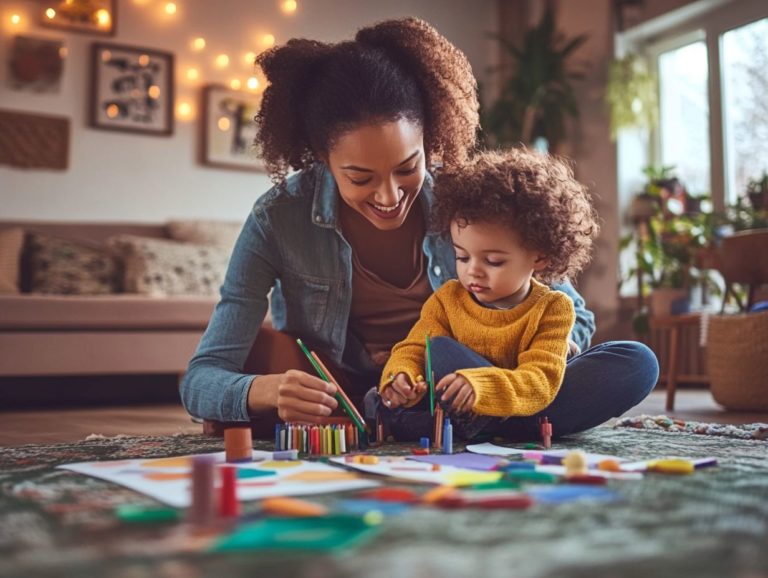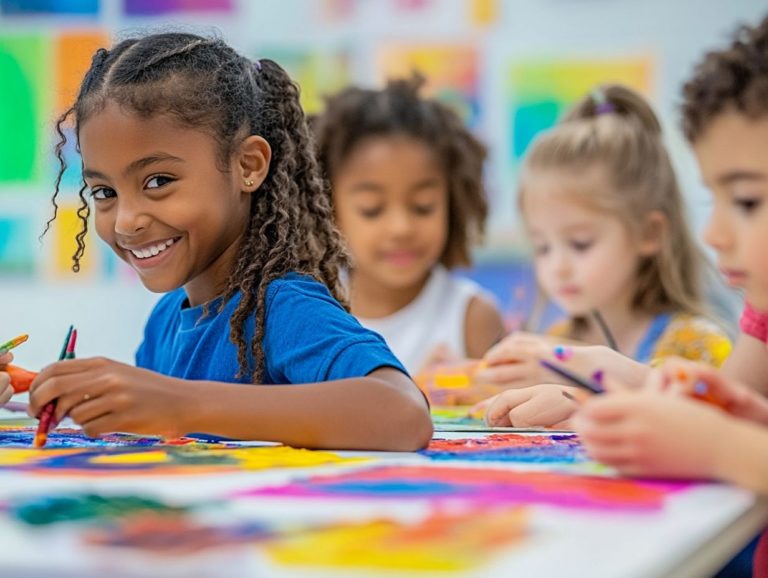5 Ways to Improve Communication with Kids
Effective communication, both verbal and nonverbal, is crucial for nurturing robust relationships between you and your young child. It cultivates understanding, establishes trust, and empowers kids to express themselves freely.
Try using five practical strategies such as active listening and positive language that can significantly enhance your communication skills with your children.
This discussion explores the importance of effective communication, common pitfalls many parents encounter, and engaging ways to spark meaningful conversations.
Elevate your connection with your children!
Contents
- Key Takeaways:
- 1. Active Listening
- 2. Use Positive Language
- 3. Encourage Open Communication
- 4. Set a Good Example
- 5. Validate Their Feelings
- Why Is Good Communication Important for Children?
- Understanding Communication with Children
- How Can Poor Communication Affect Children?
- What Are Some Common Communication Mistakes Parents Make?
- How Can Parents Improve Their Nonverbal Communication with Children?
- What Are Some Fun Ways to Practice Communication with Kids?
- How Can Parents Handle Difficult Conversations with Their Children?
- Frequently Asked Questions
- What are the top 5 ways to improve communication with kids?
- How can active listening improve communication with kids?
- Why is it important to set clear expectations for communication with kids?
- How does using positive language impact communication with kids?
- How does patience play a role in improving communication with kids?
- Why is being a role model important in improving communication with kids?
Key Takeaways:
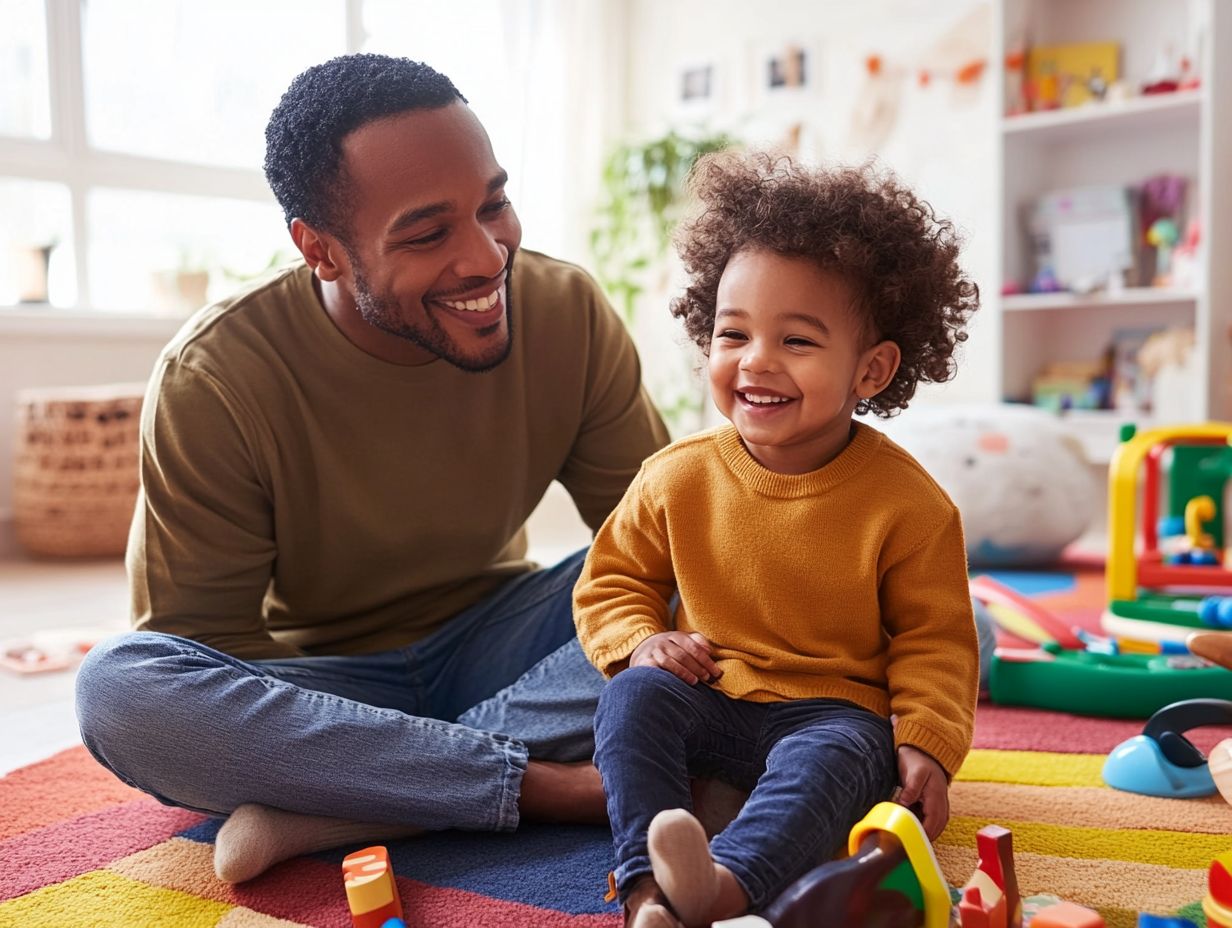
- Active listening builds trust and understanding.
- Positive language fosters respect and confidence.
- Open communication encourages emotional expression.
1. Active Listening
Active listening is essential for effective communication with a young child. It enhances verbal exchanges and nurtures emotional development, fostering a bond built on trust and empathy.
By genuinely engaging with your child’s words, you gain valuable insights into their thoughts and feelings. This can lead to a deeper parenting relationship that promotes healthy social development and self-esteem.
Try using techniques like maintaining eye contact, offering verbal affirmations such as “I see” and “That makes sense,” and asking open-ended questions to elevate the quality of these interactions. Reflecting their feelings validates their emotions and encourages them to express themselves further.
By emphasizing active listening, you enhance your communication skills, enabling you to address concerns more efficiently, solve problems collaboratively, and cultivate a nurturing environment where your child feels truly heard and understood.
2. Use Positive Language
Using positive language is crucial for guiding a young child’s emotional development. It reinforces good behavior, boosts self-esteem, and creates an atmosphere of trust and openness.
By carefully choosing kind words and offering praise, you instill a sense of worth in your child and cultivate a healthy parenting relationship based on mutual respect.
When you focus on specific actions rather than blanket statements, you encourage a deeper understanding in your child. For example, praising them for sharing their toys with a friend, instead of simply saying they are good, reinforces that particular behavior.
This type of positive reinforcement builds their confidence and enhances their self-concept, making them more likely to engage in those actions again. Over time, adopting these techniques can transform your family dynamics, forging deeper connections and fostering a more cohesive unit.
By celebrating small victories with affirmations, you and your child create a nurturing environment that is conducive to emotional growth and development.
3. Encourage Open Communication
Encouraging open communication is essential for creating a safe space where feelings can flow freely. This enhances emotional intelligence and fortifies family bonds.
By nurturing an atmosphere of trust and openness, you enable your child to share their thoughts and grasp the significance of active listening.
Integrating respectful suggestions into your conversations can guide your child in expressing themselves without the fear of judgment, thereby fostering self-esteem and confidence. Don t underestimate the power of body language; maintaining eye contact, nodding in agreement, and using inviting gestures convey your genuine interest and attentiveness.
These strategies not only deepen your connection with your child but also enrich their overall well-being. Healthy communication patterns are vital for their emotional development and resilience as they navigate life s challenges.
4. Set a Good Example
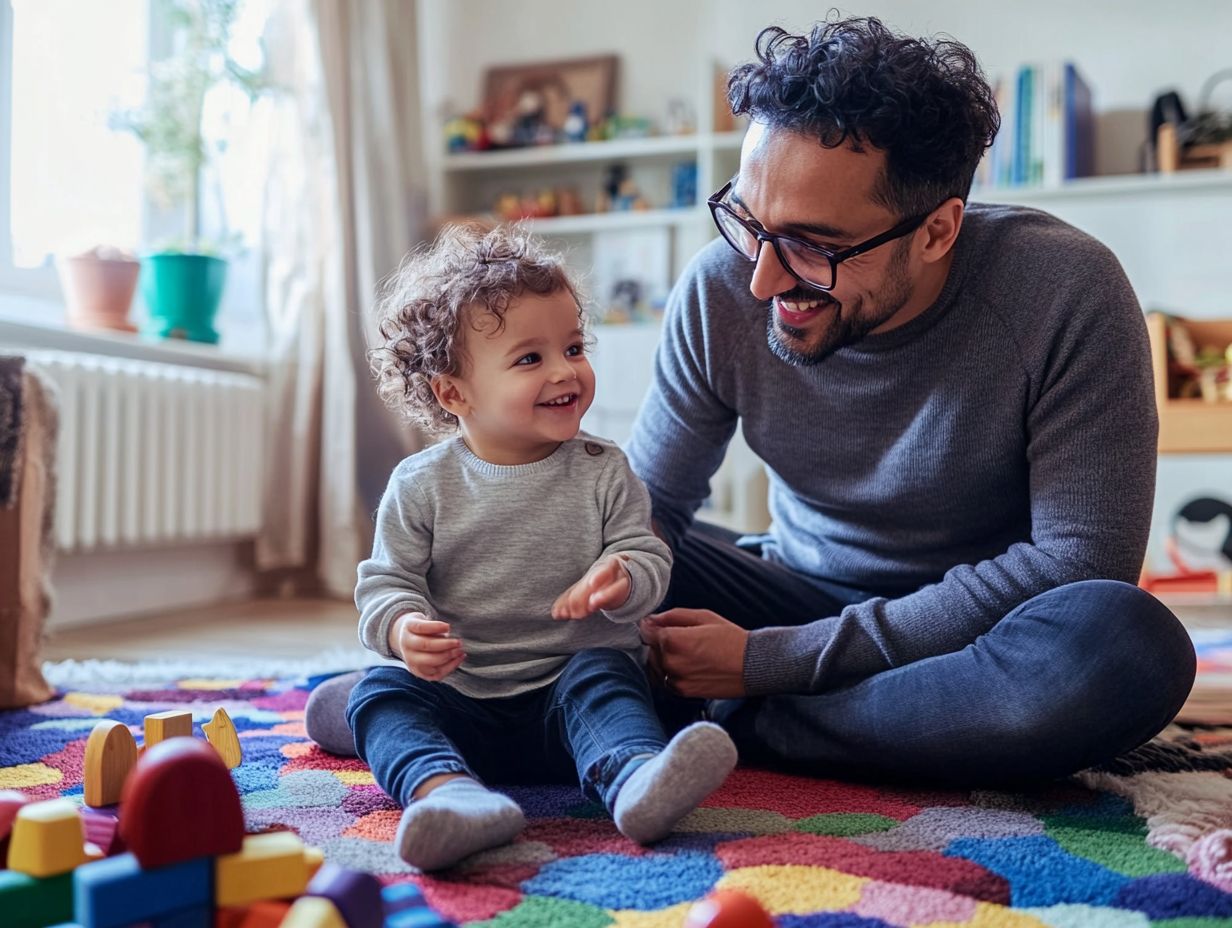
Setting a good example for a young child is essential in cultivating effective communication skills. Children naturally mirror the behaviors and attitudes of their parents. This mirroring can profoundly shape their emotional development and self-esteem.
By demonstrating active listening, using positive language, and offering respectful suggestions, you can instill values of empathy and problem-solving in your child, enhancing your nurturing parenting relationship.
When you model effective communication, you convey the importance of expressing feelings and demonstrate how to navigate conflicts with grace and understanding. Engaging in family discussions where everyone s opinion is valued showcases the power of dialogue.
By acknowledging your own emotions and articulating them appropriately, you teach a valuable lesson in vulnerability and openness.
Such behaviors create an environment where your young ones feel safe to share their experiences and emotions, ultimately reinforcing their emotional intelligence and social skills as they grow.
5. Validate Their Feelings
Validating a young child’s feelings is essential for nurturing empathy, emotional intelligence, and establishing trust and openness. This practice helps children express their emotions and strengthens the parent-child bond.
By using kind words and explaining feelings, you can create an environment where your child feels safe to express themselves without fear of judgment, which is crucial for their emotional development.
Use techniques like reflective listening to mirror your child’s expressions, providing affirmation that their feelings are truly understood. For example, when your child becomes frustrated over a disrupted playtime, acknowledging that it’s perfectly okay to feel upset can significantly decrease the chances of a tantrum.
This approach not only enhances communication skills but also enables your child to navigate their emotional landscape with greater ease. As a result, when children feel heard and valued, they are less likely to engage in problematic behaviors, contributing to a more harmonious family atmosphere.
Why Is Good Communication Important for Children?
Good communication is essential for everyone, as it profoundly influences emotional development, self-esteem, social skills, and overall well-being. By mastering effective communication, you learn to express your feelings, engage in problem-solving, and cultivate meaningful relationships with peers.
These experiences are crucial in shaping your identity and building your confidence as you mature. Cultivating strong communication skills also sharpens your cognitive abilities, allowing you to articulate your thoughts and ideas with clarity, which can enhance your academic performance.
You develop emotional intelligence by learning to understand and empathize with others, fostering deeper connections and resilience in your interpersonal relationships.
Over time, these strong communication patterns not only promote healthier interactions but also contribute to your overall well-being, equipping you to navigate challenges and conflicts with greater ease. The ripple effect of such skills is evident in your ability to collaborate and connect with diverse personalities, instilling a sense of belonging and enhancing your social development.
Understanding Communication with Children
How Can Poor Communication Affect Children?
Poor communication can have serious repercussions for children. It can potentially cause developmental delays, foster negative self-concepts, and create obstacles in emotional intelligence.
When children struggle with effective communication skills, they may find it difficult to listen actively and express their feelings. This can significantly impede their social development and overall well-being.
These challenges can manifest in various ways, such as heightened frustration when trying to express thoughts or needs. This may lead to outbursts or withdrawal in social situations.
Behavioral issues often emerge, as these children might misinterpret social cues or react inappropriately to their peers. Forming and maintaining healthy relationships becomes a significant hurdle for them, as communication is the foundation of meaningful connections.
Recognizing these barriers is essential. As a caregiver or educator, be attentive to signs like avoidance of social interaction or difficulties in resolving conflicts.
By addressing these issues early on with supportive communication strategies, you can foster improvement and help children develop the essential life skills they need to thrive.
What Are Some Common Communication Mistakes Parents Make?
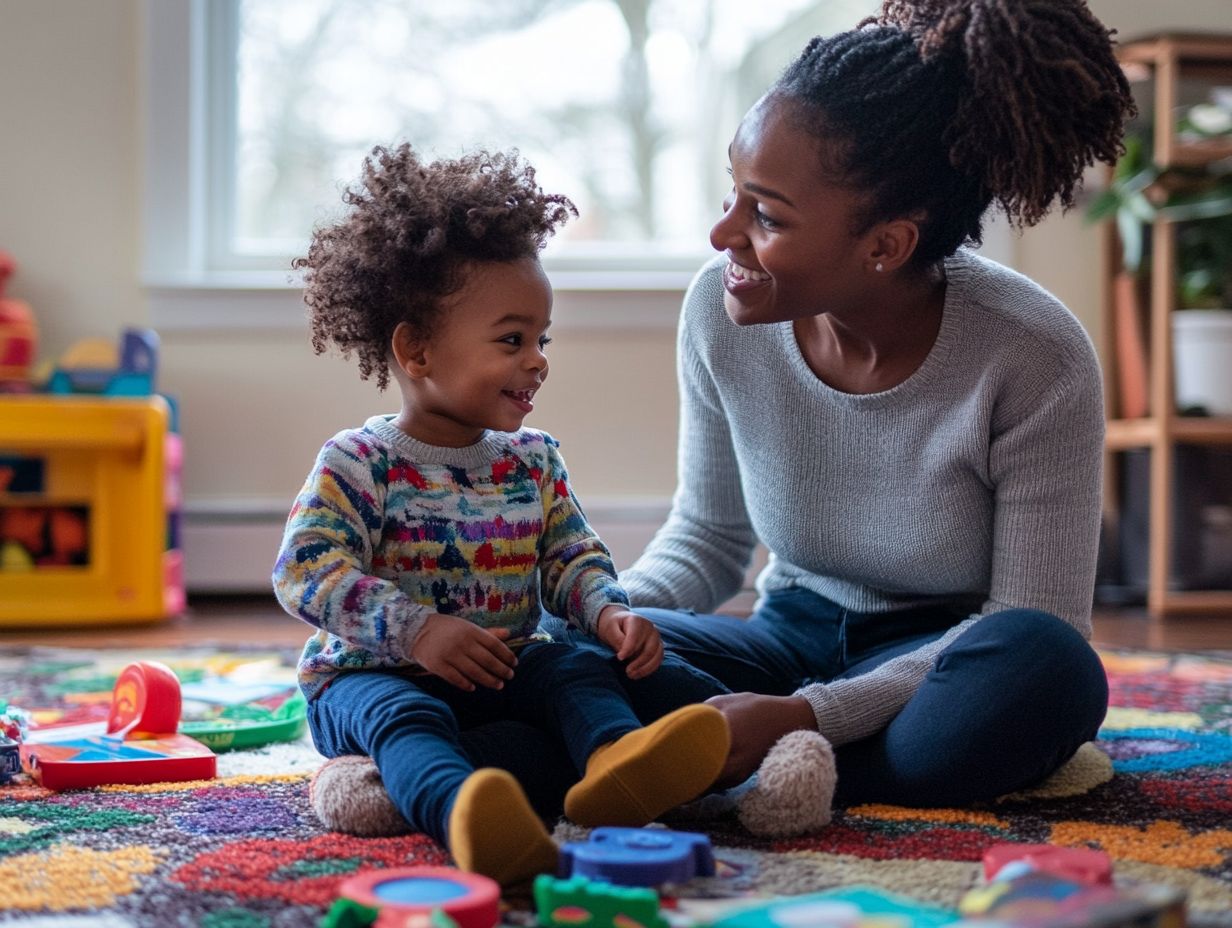
Sometimes, parents unintentionally make common communication mistakes that can adversely affect their child’s emotional development, self-esteem, and overall well-being. For instance, failing to listen actively or resorting to dismissive language can create a negative self-concept in children and obstruct their ability to express themselves.
Other pitfalls to avoid include:
- Interrupting when your child speaks, which may signal to them that their thoughts aren’t valued.
- Using overly critical language instead of offering constructive feedback, which can be detrimental.
Recognizing these missteps is crucial for cultivating a nurturing environment that fosters emotional intelligence and aids in your child’s social development. By becoming more mindful of your communication style, including noticing statements and focusing on behavior, you set the stage for healthier interactions.
Validating your child’s feelings and actively engaging in conversations, including using conversation starters and explaining feelings, can significantly enhance their confidence and help them develop stronger social skills.
By mastering effective communication, you not only support your child’s emotional growth and self-esteem, but also lay the foundation for a lasting, trusting relationship. Start your journey to better communication today!
How Can Parents Improve Their Nonverbal Communication with Children?
Improving nonverbal communication with children is crucial for fostering trust and emotional intelligence, as body language plays a significant role in how they receive messages. Techniques such as sign language can also be beneficial.
By being mindful of nonverbal cues and ensuring they align with your verbal communication, you can create a more effective and supportive environment for your child’s emotional development and social skills.
Specific techniques, such as maintaining consistent eye contact, can forge a sense of connection and attentiveness, showcasing your genuine interest in what your child is expressing.
Using open body language like keeping your arms uncrossed and leaning slightly forward signals your engagement and availability for conversation. These actions are key in building trust and openness in your parenting relationship.
Being aware of your facial expressions is equally important; a warm smile or a nod can reinforce positive interactions, while frowns or signs of disinterest may discourage your child from sharing their thoughts.
These nonverbal signals significantly impact how children perceive communication and influence their willingness to engage with others, ultimately shaping their social skills, communication patterns, and relationships. Transform your child’s confidence today!
What Are Some Fun Ways to Practice Communication with Kids?
Engaging in fun communication activities provides a remarkable opportunity for families to strengthen their bonds while enhancing essential skills like emotional intelligence and mutual understanding. By incorporating playful conversation starters and creative games, you can inspire your young child to express themselves freely, reinforcing the significance of kind words and communication. These activities also contribute to family bonding and building a safe space for open dialogues.
Activities such as storytelling or role-playing make expressing feelings a fun adventure! Picture this: your family takes turns crafting a silly story, with each person adding a sentence. It s a delightful way to let creativity run wild.
These exercises also help in explaining feelings and using clear language, making emotional expression more natural for your young child.
Games like Telephone not only sharpen listening skills but also illuminate the subtleties of communication. As children decode messages, they cultivate patience and clarity traits that are invaluable in nurturing lifelong relationships.
By weaving these enjoyable practices into your family routine, you create an atmosphere of openness that significantly nurtures emotional development, teaching children to articulate their thoughts and understand others more profoundly.
How Can Parents Handle Difficult Conversations with Their Children?
Handling difficult conversations with children requires you to strike the right balance of empathy, good problem-solving skills, and respectful communication, ensuring that your child feels truly heard and understood. You can guide your child through challenging topics, creating a supportive environment that nurtures growth, understanding, and mutual respect.
Incorporating techniques like listening and repeating what your child says to show understanding can significantly elevate the effectiveness of these discussions. When you acknowledge your child s feelings before offering thoughtful suggestions, you foster validation. This validation encourages your child to open up and express themselves more freely.
It s crucial to remain calm and patient, even when emotions run high; this not only reinforces trust but also strengthens the bond you share.
Using age-appropriate language and relatable examples can help your child grasp complex issues with greater ease. This approach enables you to create a deeper connection and nurtures a safe space for ongoing communication in the future, supporting their overall communication skills and easing developmental delays.
Frequently Asked Questions
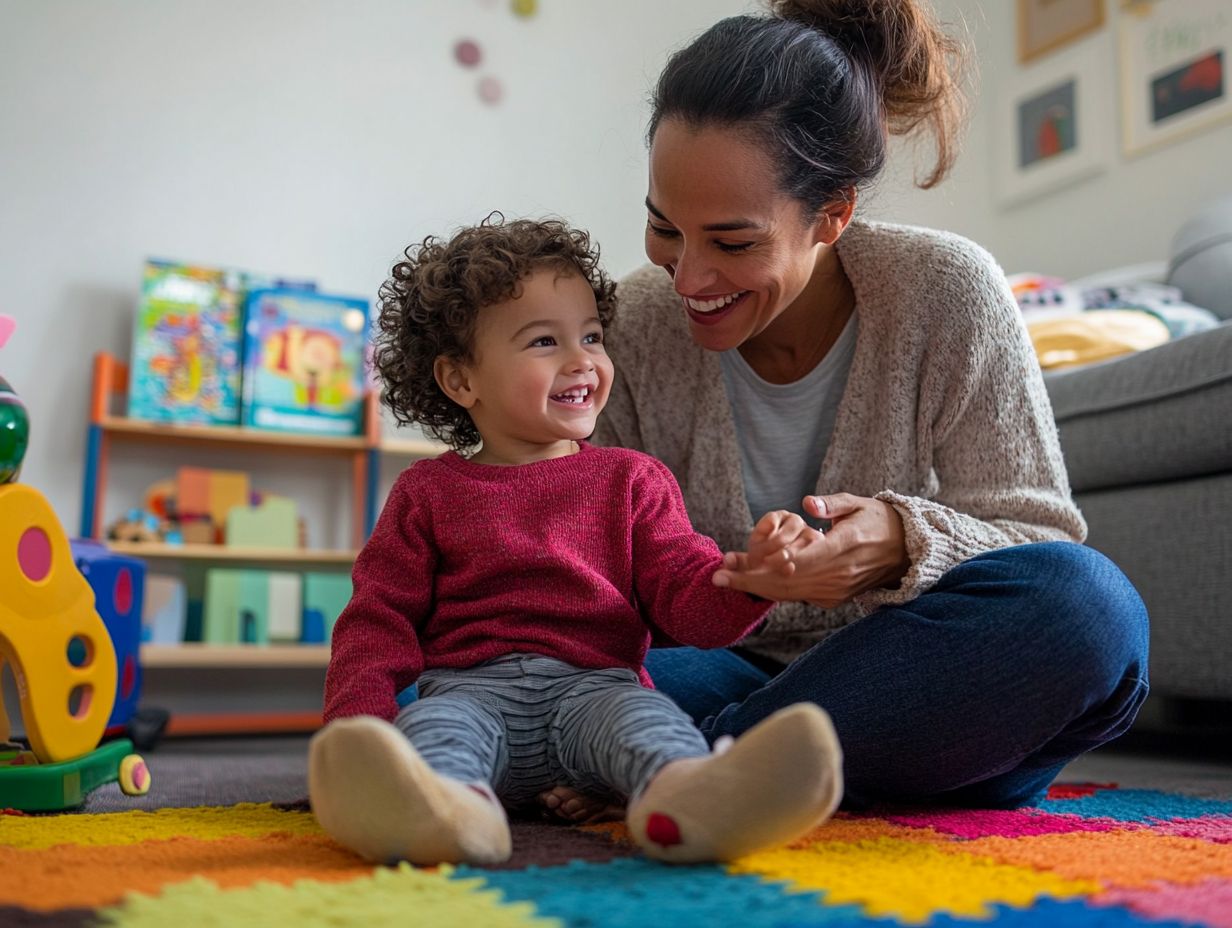
What are the top 5 ways to improve communication with kids?
1. Active Listening: Paying attention and responding with empathy to what your child is saying is key in improving communication and building trust and openness.
2. Setting Clear Expectations: Clearly stating what you expect from your child in terms of behavior and communication will make it easier for them to understand and follow through. This also helps in preventing tantrums by giving them a structured framework.
3. Using Positive Language: Instead of focusing on what your child is doing wrong, try using positive language to praise good behaviour and encourage open communication.
4. Practicing Patience: Give your child time to express themselves and don’t interrupt them mid-sentence. This shows them that their thoughts and feelings are valued.
5. Being a Role Model: Children learn by example, so make sure you are communicating effectively and respectfully with them. Leading by example also helps in reinforcing a positive communication pattern and mutual respect in your parenting relationship.
How can active listening improve communication with kids?
Active listening involves paying full attention to what your child is saying without interrupting or judging. This helps them feel heard and understood, creating a stronger foundation for communication and trust.
Listening actively also aids in decoding their underlying emotions and needs, contributing to better parenting of their emotional health.
Why is it important to set clear expectations for communication with kids?
Clear expectations give children a framework to understand what is expected of them. They learn about boundaries and consequences, which helps them communicate effectively.
How does using positive language impact communication with kids?
Using positive language creates a supportive environment. Kids can express themselves freely, building their self-esteem and encouraging open communication.
How does patience play a role in improving communication with kids?
Patience allows children to express themselves without feeling rushed. It shows them their thoughts and feelings matter, creating a safe space for conversation.
Why is being a role model important in improving communication with kids?
Being a good communicator sets a positive example for children. This builds trust and respect in the parent-child relationship, shaping their overall communication skills.


